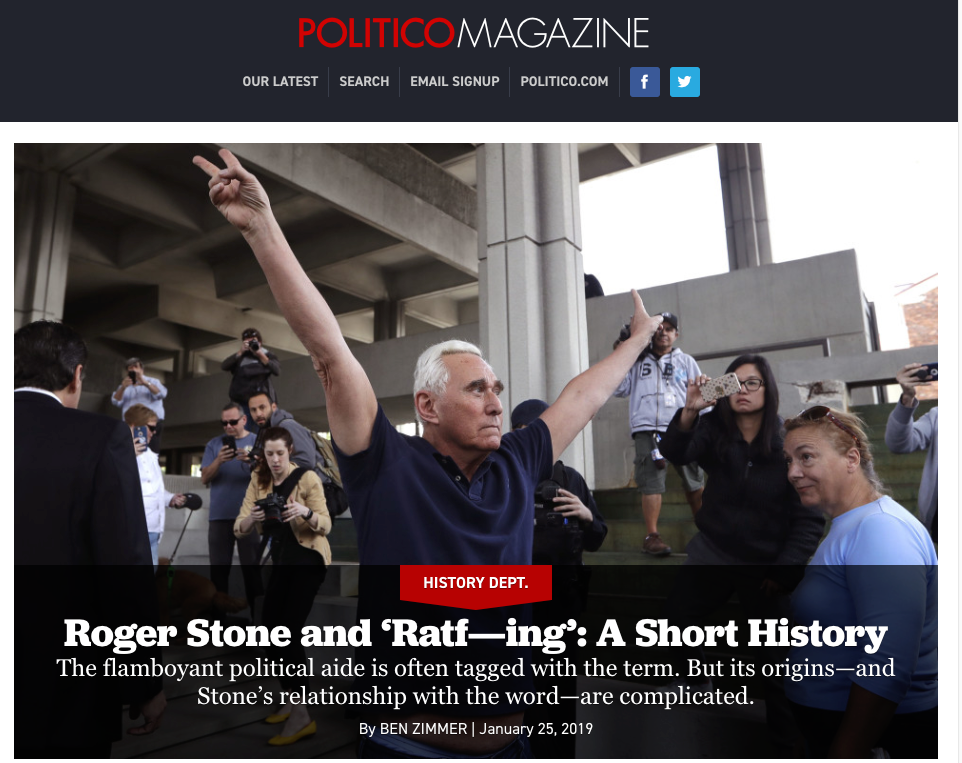Ben Zimmer on "ratfucking"
« previous post | next post »
Ben Zimmer has a great piece at Politico, "Roger Stone and 'Ratfucking': A Short History". The subtitle: "The flamboyant political aide is often tagged with the term. But its origins—and Stone’s relationship with the word—are complicated."
Ben takes the history back to one of Edmund Wilson's notebooks in 1922, and (via Jesse Sheidlower) before that to WWI military slang:
Sheidlower zeroes in on a veteran of General John J. Pershing’s American Expeditionary Force named Leonard H. Nason, who used a series of rat-related euphemisms in novels he wrote based on his experiences at war. His favorite circumlocution was “rat-kissing” to describe destructive activity, as in, “No more of this rat-kissing” (Sergeant Eadie, 1928) or, “You know, I had a sergeancy clinched if we hadn’t run into all this rat-kissing!” (The Man in the White Slicker, 1929). And in a turn of phrase that Ted Cruz would appreciate, Nason referred to “this here gigantic rat-copulation they call a war” in his 1930 novel, A Corporal Once.
Ben points out that
“Ratfucking” bears a strong resemblance to another animalistic expression used in the military—“fucking the dog,” which by World War II meant either “wasting time” or “committing a serious blunder.” As I explained in a 2015 column for Slate, “fucking the dog” received its own set of euphemisms, most notably “screwing the pooch.” We can surmise that “ratfucking” itself was also used by soldiers in the two World Wars, even though the historical examples found by Sheidlower and others involve various forms of euphemization.
The meaning of ratfucking apparently drifted from "destructive activity" or "failure" in WWI to "destructive college-age pranks" in the 1930s, and more general collegiate pranks in the 1950s and 1960s, thereby adopted by some frat boys at USC for their campus-election pranks. Three of them — Don Segretti, Dwight Chapin, and Ron Ziegler — brought the term into the Nixon campaign.
Ben notes that Roger Stone has a negative view of the term and its political sources:
Stone—who dropped out of The George Washington University to work on the 1972 campaign—never identified with what he saw as a West Coast frat-boy culture on the staff. As Stone recalled in an April 2016 Politico interview, Segretti and other USC alumni were engaged in unproductive hijinks that had no effect on swaying votes. “What was the point? Harassment? That’s ratfucking,” Stone said. “That comes out of the USC fraternity parlance. I didn’t go to USC.” […]
“The Nixon people were amateurish,” he told Rolling Stone in 2016. “They had this whole USC-fraternity mentality that took over after 1968, with the ‘ratfucking.’ This is how Watergate happens.” Stone might be right that his dirty tricks are more than merely pointless collegiate hijinks, but if his mischief-making did indeed have an impact on the 2016 election, that doesn’t do him any favors in the Mueller investigation.
I was interested to see that the term is slightly disguised in the Politico headline, as "Ratf—cking":
… but printed without the elided u in the body of the article:


Elonkareon said,
January 27, 2019 @ 12:42 pm
It's even more amusing that they left out an additional letter in the url, turning "ratf—ing" into "rating".
FM said,
January 27, 2019 @ 6:02 pm
As an undergrad at Caltech (a different SoCal school!) in the late aughts I was vaguely familiar with "RF" as a largely outdated term for a prank, and its origin as an abbreviation for "ratfuck." Some insisted that "ratfuck" was originally a name for a particular type of unpleasant prank involving a dead rat. Funny how oral traditions both survive and mutate.
cameron said,
January 28, 2019 @ 9:09 pm
I'm surprised Zimmer didn't draw a connection to Ed "Big Daddy" Roth's charcter Rat Fink, who is usually depicted wearing a t-shirt with the initials R. F. prominently displayed.